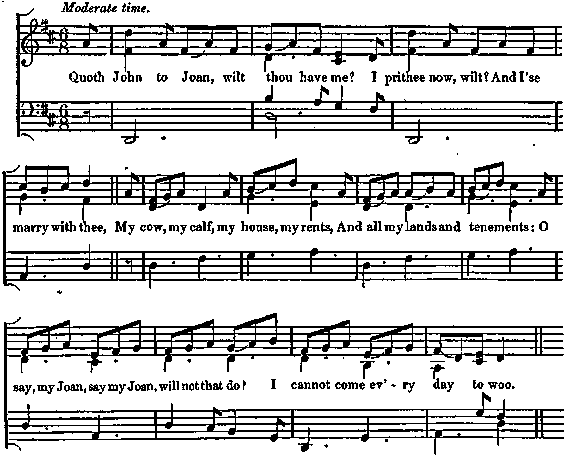Popular Music Of The Olden Time Vol 1
Ancient Songs, Ballads, & Dance Tunes, Sheet Music & Lyrics - online book
| Share page | Visit Us On FB |
|
FROM HENRY VII. TO MARY. |
87 |
|||
|
Library of the Society of Antiquaries. It is on Ballard and Babington's conspiracy, and was written just after their execution, in 1586. Wilson's Delight, Arthur a Bradley, and Mall Dixon's Round, are mentioned as popular tunes in Braithwaitc's Strappado for the Devil, 1615.
The song, " Quoth John to Joan," or " I cannot come every day to woo," is certainly as old as the time of Henry VIII., because the first verse is to be found elaborately set to music in a manuscript of that date, formerly in the possession of Stafford Smith (who printed the song in Musica Antiqua, vol. i., p. 32), and now in that of Dr. Rimbault. There are two copies of the words in vol. ii. of the Roxburghe Collection of Ballads, and it is in all the editions of Wit and Mirth, or Pills to purge Melancholy, from 1698 to 1719. In Wifs Cabinet, 1731, it is called " The Clown's Courtship, sung to the King at Windsor." |
||||
|
|
||||
 |
||||
|
|
||||
|
I've corn and hay in the barn hard by, And three fat hogs pent up in the sty ; I have a mare, and she is coal-black, I ride on her tail to save her back.
Then say, my Joan, &c. |
I have a cheese upon the shelf, And I cannot eat it all myself; I've three good marks that lie in a rag, In the nook of the chimney, instead of a bag. Then say, my Joan, &c. |
|||
|
|
||||
|
To marry I would have thy consent,
But, faith, I never could compliment;
I can say nought hut " hoy, gee ho,"
Words that belong to the cart and the plough :
Then say, my Joan, say, my Joan, will that not do, I cannot come every day to woo. |
||||